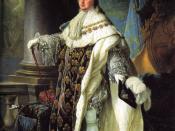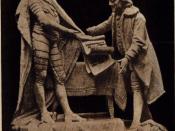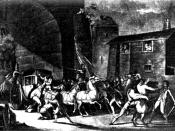King Louis XVI came into power from the years 1769 to 1789. He ruled as a monarchy and as more problems began to occur throughout France many changes and revolts started throughout the country, one of the first major uprisings being an opposition created by the Third Estate to the states general. The King was a weak leader that spent much of the country's money on personal luxuries. He ruled by 'divine right' as his predecessors had but, he didn't have the power to use the government facilities to his advantage eg. the lit de justice therefore this and many failed decisions made by him lead to himself being beheaded.
When King Louis XVI gained the royal title at only twenty years of age he began with a good start. He started off with minor changes which would please "his people" such as reshuffling his council and dismissing Abbot Teray and Chancellor Maupeou- whose reforms had caused public resentment.
He also dismissed Turgot- whose reforms were angering the noblemen and bourgeois. The King then impressed the people further by releasing the last remaining serfs on the land, abolishing torture as way of confession and reorganizing prison systems in order to improve jail conditions. These few changes began to make all the difference as the nation was gaining a certain trust and interest in this man.
Everything appeared to be going well until problems began to hit, one after the other. The country's economy was plummeting and they were stuck with a large deficit. This was now appearing to be Louis XIV and XVI fault as they had involved France with expensive wars such as the American war of Independence, the Seven Years War and the War of the Spanish Succession. The absurd methods of tax collection, the unequal tax distribution,


